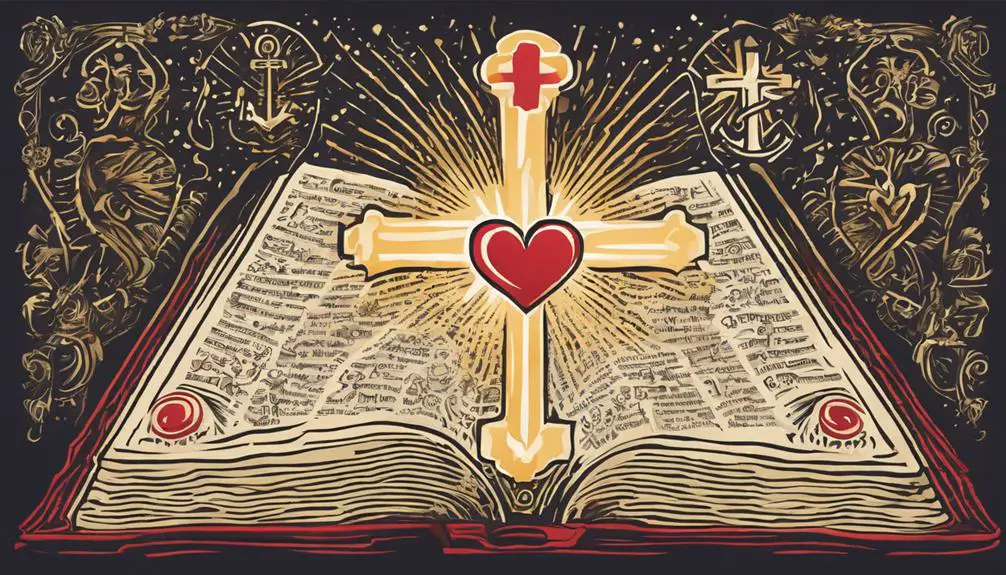Frequency in the Bible fosters a fascinating exploration into recurring patterns and their profound implications in spiritual narratives.

Frequency in the Bible
Just as the repeated notes in a symphony create a melody, the recurring words, phrases, and numbers in the Bible generate a significant rhythm and pattern.
Have you ever considered the frequency of certain elements within Biblical texts and how they contribute to the overall message?
From the number seven's symbolic meaning of completeness and perfection to the frequent usage of key words like 'faith,' 'love,' and 'covenant,' these repetitions carry profound implications.
They pose intriguing questions, sparking a curiosity that invites you to venture further into the depths of Biblical analysis.
Key Takeaways
- Numerical analysis uncovers symbolic meanings of recurrent numbers in the Bible, enhancing comprehension of the scripture's divine design.
- Repetition of certain words and phrases in the Bible emphasizes key themes, aiding in memory retention and deeper understanding.
- Recurring themes and symbols, such as redemption and animal symbolism, add layers of meaning and richness to biblical narratives.
- Studying biblical genealogies provides insights into historical, cultural, and societal contexts, enriching understanding of biblical themes and narratives.
Understanding Biblical Numerology

To truly grasp the significance of numbers in the Bible, you must first delve into the realm of biblical numerology, a field that meticulously analyzes the recurrence and symbolic meaning of numbers throughout the sacred text. You're not just counting numbers; you're interpreting powerful, underlying messages that often carry profound spiritual significance.
Biblical numerology offers a gateway into understanding these embedded messages. This discipline provides an analytical framework for extracting hidden meanings, letting you decipher biblical codes that might otherwise remain obscured. From the number of days of creation to the symbolic use of twelve tribes of Israel, biblical numerology elucidates the patterns of numbers within the text.
These numerological interpretations aren't haphazard guesswork; they're grounded in rigorous analysis and deep theological understanding. For instance, the number seven often symbolizes completion or perfection, stemming from the seven days of creation. Similarly, the number twelve, frequently appearing in the contexts of tribes and apostles, signifies governmental perfection.
Thus, biblical numerology isn't a mere sideline of biblical studies. It's an essential tool for anyone keen on delving deeper into the Bible's profound, intricate layers of meaning. It's not just about reading the Bible, it's about understanding it.
Frequency of Numbers in the Bible

Now that you're equipped with a basic understanding of biblical numerology, let's explore the frequency of numbers in the Bible, an aspect that further enriches our comprehension of the text's hidden messages. A detailed examination uncovers a pattern of specific numbers recurring with unusual regularity, which scholars term as 'numerical miracles'.
While some numbers, like seven, are commonly recognized for their frequency and significance, less obvious numbers like 144 or 666 are also noteworthy. The number seven appears over 700 times in the Bible, symbolizing divine perfection and completion. On the other hand, 666, the number of the beast, is a symbol of imperfection and sin.
These aren't random occurrences, but rather part of a divine calculation, deliberately woven into the scripture's fabric. They serve a purpose, often signifying deeper theological concepts or prophetic events. The frequency of these numbers is a testament to the text's intricate design, inviting readers to delve deeper into the scripture's mysteries, enhancing their understanding of biblical messages.
Observing such patterns is a testament to the Bible's complexity and depth, underlining the divine calculation at play and the importance of numerical miracles in understanding the text.
Most Repeated Words in Scripture

Delving into the realm of repetition, you'll find that certain words echo throughout the Bible with remarkable frequency, shedding light on the scripture's central themes and reflecting its theological focus. A scriptural vocabulary analysis reveals these words acting as threads, weaving a tapestry of biblical narratives and teachings.
Here are the five most repeated words in the Bible:
- 'Lord'
- 'God'
- 'Israel'
- 'Son'
- 'People'
Each of these words holds significant biblical word origins and connotations. 'Lord' and 'God' depict divine authority and omnipotence. 'Israel' represents the chosen people and the promised land. 'Son' signifies lineage and Jesus Christ's divinity. Lastly, 'people' embodies the community of believers and mankind.
Understanding these frequent words can deepen your grasp of the Scripture's themes and messages. The recurrence of these words isn't accidental but intentional, pointing towards the Bible's theological focus. They illuminate the divine-human relationship, God's sovereignty, salvation, and covenant promises.
While these words are the most frequent, remember that every word in the Bible carries equal weight. Studying each one allows you to appreciate the Scripture's richness, complexity, and unchanging truth.
Common Themes and Their Frequency

Let's turn our attention to prominent themes in the Bible and their frequency, as these recurring motifs provide a profound understanding of the biblical narrative. By observing the repetition of these themes, we can delve deeper into the Biblical Theme Evolution, which reveals the changing emphasis and development of ideas over time.
A Repetitive Symbols Analysis shows that redemption, covenant, and divine guidance are among the most frequently appearing themes. Redemption, symbolized through sacrificial acts, appears approximately 200 times, emphasizing God's desire to save humanity from sin. The theme of the covenant, representing God's promise to his people, emerges around 280 times, underscoring God's unwavering commitment. Divine guidance, often symbolized through pillars of fire or cloud, surfaces nearly 250 times, reinforcing the faithfulness of God's guidance.
Moreover, this analysis reveals an intriguing pattern: these themes don't just recur; they evolve. For instance, redemption initially appears in the context of individual salvation, but later it expands to national and even cosmic scales. This evolution of themes adds a dynamic layer to biblical interpretation, allowing us to appreciate the Bible's complex undulating narrative in a more nuanced way.
Patterns in Biblical Genealogy

Moving on to biblical genealogies, you'll find intricate patterns that provide valuable insights into the cultural, social, and historical contexts of the Bible. These patterns often have Genealogical Significance, emphasizing Ancestral Continuity, and serve as more than mere chronicles of family histories.
By closely studying these genealogies, you can discern:
- The importance placed on lineage and heritage in biblical times.
- The cultural significance of ancestry, as seen through repeated familial ties.
- The societal hierarchy and roles reflected in the genealogies.
- The historical context and events that shaped these families' narratives.
- The genealogical patterns that resonate with the overarching themes of the Bible.
For instance, the genealogy of Christ in the Book of Matthew is presented in three sets of 14 generations, a pattern that reflects the cultural and historical context of the Jewish people. Patterns like these underscore the Genealogical Significance in the Bible and strengthen the sense of Ancestral Continuity. The patterns in biblical genealogies are as essential to understanding the Bible as the text itself, offering rich, contextual layers to the narratives we delve into.
Symbolism of Frequent Phrases

Turning our attention to the symbolism of frequent phrases, you'll notice that the Bible uses certain terms and expressions repetitively to convey specific, profound meanings. This strategic use of language provides an additional layer of depth to the text, enhancing our understanding and connection to the messages conveyed.
Consider the Symbolic Colors Interpretation. In Biblical text, colors are often representative of certain themes or concepts. Red typically symbolizes sin or redemption, white purity and holiness, while black often signifies death or evil. When you encounter these colors in the text, they serve as visual cues, allowing for a richer, more nuanced interpretation of the narrative.
Similarly, Biblical Animal Symbolism plays a significant role. Animals in scripture are frequently symbolic of human characteristics or divine messages. For instance, the lamb often represents Jesus Christ, while the serpent is regularly associated with Satan.
Thus, the frequency of certain phrases, coupled with the symbolism attached, isn't arbitrary. It's a tool used to reinforce themes, underscore motifs, and deepen our comprehension of the text. Recognizing and understanding this tool will greatly enrich your study and appreciation of the Bible.
Frequently Asked Questions
How Does the Frequency of Specific Events in the Bible Influence Its Overall Message?
The repetition of certain events in any narrative, including the Bible, shapes its overall message significantly. You may interpret these recurring instances as a form of emphasis, highlighting key themes or morals.
In the Bible, the frequency of specific symbols often contributes to its profound interpretations. This repetition, in essence, enhances your understanding of the text's complexities, delivering a more profound, layered message.
Are There Any Correlations Between the Frequency of Biblical Numbers and Their Significance in Numerology?
Yes, you'll find correlations between the frequency of biblical numbers and their significance in numerology.
For example, the number seven, often seen in Biblical number patterns, symbolizes perfection and completeness in numerology symbolism.
This correlation, among others, can help you gain a deeper understanding of the Bible's messages and themes.
However, it's important to approach this analysis with a discerning mind as interpretations may vary.
How Does the Frequency of Words in Different Translations of the Bible Compare?
You're looking at translation variations, diving into word analysis.
Comparing word frequency in different Bible translations can be complex. Some translations may use more modern language or different phrasing, thus varying word counts.
It's not just about word-for-word translation. It's about capturing the essence of the original texts. Therefore, the frequency of certain words will vary across translations, reflecting differences in interpretation and linguistic style.
Does the Frequency of Themes in the Bible Differ Between the Old and New Testament?
You're delving into a comparative analysis of prophetic themes between the Old and New Testaments. Yes, there are differences. The Old Testament often focuses on judgement and law, while the New Testament emphasizes grace and love.
However, the distinguishing moral lessons remain consistent across both, emphasizing virtues like love, justice, and humility. It's a complex topic, and further study can reveal more about these thematic variations.
How Does the Frequency of Names in Biblical Genealogy Contribute to the Understanding of Biblical History?
By analyzing genealogical patterns, you're able to discern insights into biblical history.
The frequency of names provides clues about cultural and societal shifts. Understanding biblical name origins also contributes to this analysis. Biblical names often have significant meanings, reflecting the circumstances of a person's birth or character traits.
This, when tied with genealogical patterns, helps you grasp the complexities of biblical history in a nuanced way.
Conclusion
In conclusion, you've seen how the Bible uses frequency in various ways. The recurrence of numbers, words, themes, and genealogical patterns all hold significant meaning.
These frequent phrases and symbols aren't mere coincidences, but are key to deeper understanding and interpretation.
Always remember, the Bible's intricate design goes beyond surface level reading and invites you into a profound exploration of its divine wisdom.



Sign up